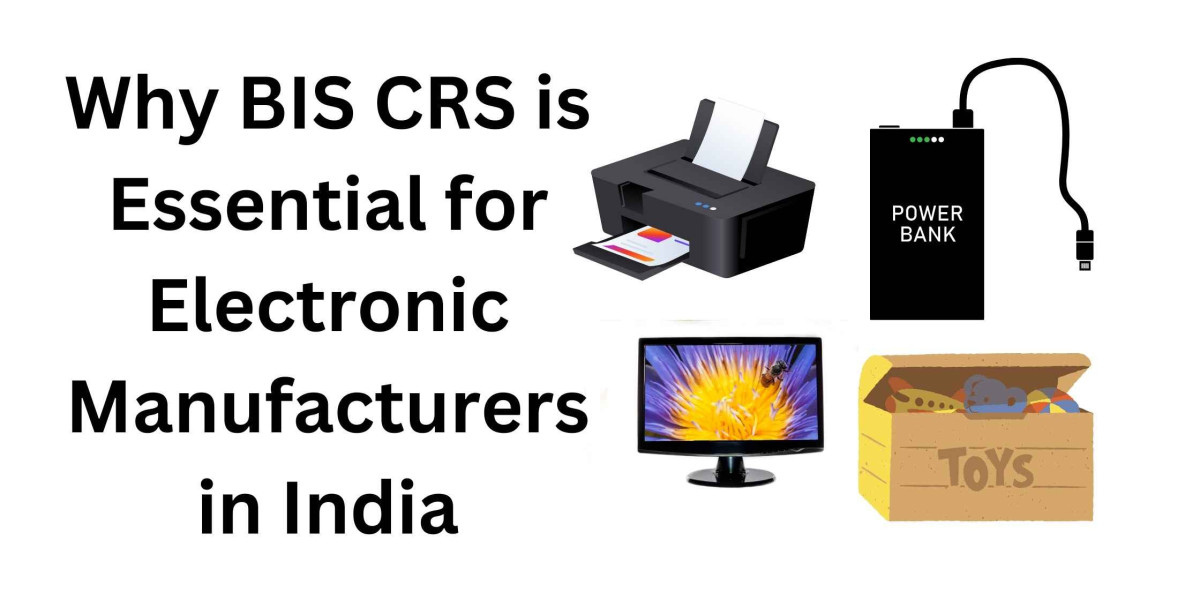In today's fast-growing world of technology and innovation, electronics have become an important part of our lives. From smartphones to home appliances, electronic products are everywhere. But with the increase in demand for electronic goods, it has become essential to ensure that these products are safe and meet certain quality standards. In India, this is where the Bureau of Indian Standards (BIS) comes into the picture. BIS provides the Compulsory Registration Scheme (CRS), a certification program that helps maintain quality and safety in electronics.
This blog will explain why BIS CRS is essential for electronic manufacturers in India, how it benefits both manufacturers and consumers, and the steps involved in getting certified.
What is BIS CRS?
BIS CRS, or Compulsory Registration Scheme, was introduced by the Bureau of Indian Standards (BIS) in 2012. The goal of this scheme is to ensure that all electronic products sold in India meet a certain level of safety and quality. Under BIS CRS, certain electronic products need to be tested and certified by BIS-approved labs before they can be sold in the Indian market.
This includes not just electronic devices but also products like toys, power banks, and other goods that require BIS certification. For instance, the demand for BIS certification for toys in India has grown as toy manufacturers need to ensure their products meet safety standards to protect children from harmful materials.
Similarly, a product like a BIS certified power bank ensures that consumers are purchasing power banks that are safe to use, preventing issues such as battery malfunctions or overheating.
Manufacturers, whether domestic or international, must get their products registered with BIS if they fall under the categories listed under CRS. The registration helps in preventing the sale of low-quality or unsafe products and ensures the safety of Indian consumers.
Why is BIS CRS Important for Electronic Manufacturers?
1. Legal Requirement: The most obvious reason why BIS CRS is essential for electronic manufacturers is that it is a legal requirement. If a manufacturer is producing or importing products that are covered under BIS CRS but fails to get them registered, they can face legal consequences. These consequences could include fines, bans on selling the product, or even shutting down the business.
Whether it's obtaining BIS CRS certificate registration for electronics or BIS certification for toys in India, complying with BIS ensures that manufacturers are following Indian laws. This allows them to smoothly operate their business without worrying about legal troubles.
2. Ensures Product Safety: One of the main purposes of BIS CRS is to ensure that electronic products are safe for consumers. Poor-quality electronic products can cause several risks, such as electric shocks, fires, or malfunctions. When manufacturers register their products under BIS certificate registration, they have to undergo safety tests that ensure the product meets the required safety standards.
This not only protects consumers from harm but also helps manufacturers build trust in their brand by showing that they prioritize safety.
3. Improves Product Quality: Along with safety, BIS CRS also focuses on improving the overall quality of electronic products. Through BIS testing, manufacturers can identify any design flaws or production issues that may affect product performance. By fixing these issues, manufacturers can improve the quality of their products, which ultimately leads to higher customer satisfaction.
High-quality products, such as BIS certified power banks, often translate into better reviews, repeat customers, and long-term business growth.
4. Boosts Market Access: BIS CRS certification is required not only for Indian manufacturers but also for international companies that want to sell their electronic products in India. For foreign manufacturers, getting BIS CRS certification allows them to access one of the largest consumer markets in the world.
India’s growing demand for electronic devices makes it a highly attractive market for international businesses. By meeting the BIS certificate registration requirements, foreign companies can successfully enter the Indian market and expand their business.
5. Increases Consumer Trust: In today’s competitive market, consumer trust plays a crucial role in the success of any product. When consumers see that a product has BIS certification, it gives them confidence that the product has been tested and is safe to use. This makes them more likely to buy the product.
For example, whether it’s buying a BIS certified power bank or toys with BIS certification for toys in India, consumers feel secure knowing the products they are purchasing meet safety standards.
6. Helps in Brand Recognition: A BIS-certified product can enhance the reputation of the manufacturer. When a company consistently provides high-quality products that meet BIS standards, it helps build the company’s image as a reliable and trusted brand. Over time, this positive brand image can lead to a stronger market presence and customer loyalty.
Additionally, manufacturers who comply with BIS standards can use the BIS logo on their products, which acts as a mark of quality for the consumer.
7. Promotes Industry Standards: BIS CRS promotes the development and implementation of uniform standards across the electronics industry in India. By following these standards, manufacturers help in maintaining a level playing field where quality and safety are priorities. This prevents inferior products from flooding the market and helps maintain a high standard for Indian electronics.
Moreover, by adhering to BIS standards, manufacturers also keep up with global best practices, which improves the overall competitiveness of India’s electronics industry on the world stage.
For manufacturers involved in areas like foreign product exports, BIS FMCS certification (Foreign Manufacturers Certification Scheme) plays a key role in maintaining the same quality standards globally, ensuring that products manufactured abroad but sold in India meet BIS standards.
Products That Need BIS CRS
Under BIS CRS, there is a list of specific electronic products that require certification. Some of the popular categories include:
- Laptops, tablets, and personal computers
- LED/LCD televisions
- Set-top boxes
- Mobile phones and battery chargers
- Microwave ovens
- Printers and scanners
- Wireless keyboards and mouse
- Power adapters
- Power banks
- Toys
The list is regularly updated by the government to include new products that require mandatory certification.
Steps to Get BIS CRS Certification
The process for obtaining BIS CRS certificate registration involves several steps, which can vary slightly depending on the type of product and its technical specifications. Here is an overview of the general process:
1. Product Testing: The manufacturer needs to send their product to a BIS-approved testing laboratory for evaluation. The lab conducts various tests to ensure that the product meets the safety and quality standards set by BIS.
2. Submit Application: Once the testing is completed, the manufacturer must submit an application to BIS for registration. The application should include detailed information about the product, test reports from the approved laboratory, and other required documents.
3. BIS Review: BIS reviews the application and the test reports to verify if the product complies with the standards. If everything is in order, BIS grants the manufacturer a license to use the BIS certification mark.
4. Compliance Audits: After receiving the certification, manufacturers must maintain continuous compliance with the standards. BIS may conduct periodic audits or testing to ensure that the products still meet the required standards.
5. Renewal: The BIS CRS certification is valid for a certain period, after which the manufacturer must apply for renewal. The renewal process typically involves re-testing the product and submitting an updated application.
Conclusion
BIS CRS is not just a regulatory hurdle for electronic manufacturers in India; it is a crucial step in ensuring safety, improving product quality, and gaining consumer trust. By complying with BIS CRS certificate registration standards, manufacturers protect themselves from legal issues and build a solid reputation for their brand. Moreover, BIS certification opens doors to the growing Indian market, offering significant business opportunities for both domestic and international companies.
In a country where electronics are an integral part of everyday life, manufacturers who prioritize quality and safety through BIS certification—whether for electronics, toys, or power banks—are setting themselves up for long-term success.








